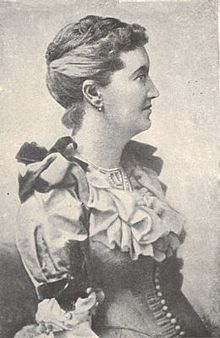Elizabeth Thomasina Meade Smith | |
|---|---|
 Photo portrait, 1912 | |
| Born | 1844 Bandon, County Cork, Munster, Ireland |
| Died | 1914 |
| Pen name | L. T. Meade |
| Occupation | Writer, editor |
| Nationality | Irish |
| Citizenship | British |
| Period | 19th century |
| Genre | Children's literature, mystery |
| Spouse | Alfred Toulmin Smith (m. 1879) |
Elizabeth Thomasina Meade Smith (1844–1914), writing under the pseudonym L. T. Meade, was a prolific writer of girls' stories. She was born in Bandon, County Cork, Ireland, daughter of Rev. R. T. Meade, of Nohoval, County Cork.[1] She later moved to London, where she married Alfred Toulmin Smith in September 1879.
She began writing at 17 and produced over 280 books in her lifetime,[2] being so prolific that no fewer than eleven new titles under her byline appeared in the first few years after her death.
She was primarily known for her books for young people, of which the most famous was A World of Girls, published in 1886. A World of Girls sold 37,000 copies and was highly influential on girls’ school stories of the twentieth century.[3] However, she also wrote "sentimental" and "sensational" stories, religious stories, historical novels, adventure, romances, and mysteries, including several with male co-authors. The first of these was Dr. Clifford Halifax, with whom she first collaborated in 1893 and wrote six books. A year later she first teamed with Robert Eustace, and turned out eleven volumes with him.
Her last co-author was Sir Robert Kennaway Douglas (her daughter's father-in-law); they produced only one book, in 1897. The Eustace partnerships are notable for two female villains, Madame Sara (in The Sorceress of the Strand) and Madame Koluchy (the mastermind of a band of gangsters, in The Brotherhood of the Seven Kings). Meade and Eustace also created the occult detective and palmist Diana Marburg ("the Oracle of Maddox Street"), who first appeared in the US edition of Pearson's Magazine in 1902.[4]
One of her most unusual titles is Dumps; A Plain Girl (1905). She was also the editor of a popular girls' magazine, Atalanta.
Meade was a feminist and a member of the Pioneer Club. Following the death of women's-rights pioneer and Pioneer Club founder Emily Langton Massingberd (1847–1897), Meade wrote a novel in 1898 based on her life titled The Cleverest Woman in England.[5][6][7][8]
- ^ Stephen Brown: A Reader's Guide to Irish Fiction (1910)
- ^ "The Bandon born author who pioneered girls school tales". The Southern Star. 10 November 2014. Archived from the original on 28 February 2017.
- ^ "LT Meade, the JK Rowling of her day, remembered 100 years on". The Irish Times. Retrieved 25 May 2023.
- ^ Illes, Judika (2017). The Wesier Book of Occult Detectives: 13 Stories of Supernatural Sleuthing. p. 113. ISBN 9781578636242.
- ^ Pilz, Anna; Standlee, Whitney (March 2018). Irish Women's Writing, 1878-1922: Advancing the Cause of Liberty. ISBN 9781526127112.
- ^ "Women and Power: Emily Massingberd".
- ^ "The Bookseller, Newsdealer and Stationer". 1899.
- ^ Whitney Standlee, Power to Observe: Irish Women Novelists in Britain, 1890-1916. Bern: Peter Lang, 2015, p. 78.